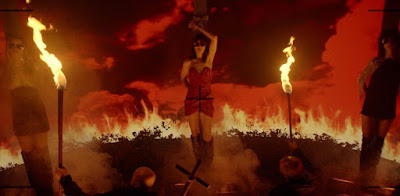The process of making movies is sometimes referred to as “magic,” and that’s usually meant in a benevolent way, describing the process of surprising and delighting an audience. But magic also involves deception, trickery and misdirection. And other types of magic involve blood sacrifices and bargains with powerful evil. The more powerful the magic, the higher the cost.
Lux Æterna (Eternal Light), a short, dizzying blast of a film, makes a good case for the filmmaking process involving all of these things, if only metaphorically.
It begins with a quote from Fyodor Dostoevsky about the supreme happiness an epileptic feels in the moments before the onset of a seizure, followed by old black-and-white footage that illustrates the type of torture implements used in the Middle Ages to get witches to confess. And then from there, we’re presented with a conversation between two women, with one asking the other if she’s ever been burned at the stake. It’d be easy to dismiss this as arty nonsense, but it doesn’t take long for things to come into focus. The two women are Béatrice and Charlotte - Béatrice is directing a film and Charlotte is her lead actress. They’re preparing to shoot a scene in which Charlotte is going to be burned at the stake, and at least for the moment, it’s a quiet, pleasant conversation between two veterans of the industry about their experiences.
And then they’re called to set.
It's a short film (slightly less than an hour), but I think that’s for the better because it’s a very uncomfortable experience. The majority (if not entirety) of it is shot using hand-held cameras, which gives everything a raw immediacy and a bit of seasick wooziness to it. Following Béatrice and Charlotte as they try to get from point A to point B to shoot a single scene only to be waylaid at every turn by yet another person who needs to speak to them right now about stuff that really doesn’t matter gives the whole thing the feeling of one of those dreams (or nightmares, depending on how you think about it) where you’re just trying to get someplace, but the harder you try to get there, the more lost and sidetracked you get. And the cinematography is as aggressive as the characters; there’s a lot of split-screen work used to show us two different people’s experiences at the same time, or showing us one person from two different perspectives, in some moments even turning away from one camera to confront the other in a manner that reminds me of nothing so much as Timecode, a film I haven’t thought about in years. It, too, was a film about the messy way films get made, but it never reaches the hysteric heights that this one does, nor does it make the point this film makes about women, the men who are sure they know what is best for them, and the way that the former are often (as they have been for hundreds of years) sacrificed for the egos of the latter. It’s not an especially subtle point, with a small handful of female characters endlessly surrounded by hordes of men cajoling, flattering, ordering and threatening them, clearly resentful of their agency or casually underestimating them. Whether the stake is real or set dressing, someone’s getting burned.
All of the disparate ideas - witch trials, the demands of cinema, the power of light to create feelings and experiences (some overwhelming - the film opens with a warning for people with photosensitive epilepsy and believe me they are not fucking kidding) come together in a climax where a lighting glitch turns a scene full of angry men ranting at three women posed on stakes into a stroboscopic frenzy that eventually swallows everything. But there is none of Dostoevsky’s ecstasy, just the final moment where the center fails to hold and everything falls apart.
IMDB entry
Available on Tubi
Available on Amazon


No comments:
Post a Comment